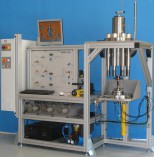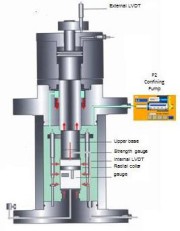A Triaxial Complete Machine
The tests are performed in a triaxial cell capable of supporting up to 100 MPa for confining and deviatoric stress on geo-materials cored or manufactured, in diameters ranging from 20 mm to 100 mm and heights from 40 to 200 mm.
Multiple sensors can continuously monitor axial and radial deformations of the sample, as the parameters of pressure applied.
The tests can be performed at room temperature, but there are also different versions of the equipment that can be heated up to 200 °C.
In addition to the axial and radial pressures that can carry many mechanical tests, the sample can be subjected to a pressure drainage, gas or liquid. It is then possible to perform permeability tests.
The unit is managed with an Industrial Control System that allows real time monitoring all measured parameters and controlling the different pressure circuits.
Self Compensated Cell
Also a benefit of the design of the Rock Machine triaxial Stac is to have a self-compensated axial pressure.
An intermediate chamber compensates the axial stress created
by the confining pressure on the sample and changes in
confining pressure have no influence on the axial pressure.
This unit may nevertheless be used for axisymmetric testing by sealing the chamber circuit.
A Full potential of Testing
The first tests presented below are used to measure the mechanical properties of a sample. These tests use independently or simultaneously, the opportunities provided by the axial pressure and the confining pressure. Each circuit for axial or radial stress is controlled by a High Pressure Metering Pump to a level of constant, variable, or cyclic pressure. The circuits are controlled by an industrial control system. All thesetests can be performed without drainage in the sample or a sample put under pressure by internal drainage.
- Unconfined (uniaxial) compression tests
- Hydrostatic Tests
- Triaxialbasic test
- Creep test
- Triaxialproportional or additive
- Triaxiallateral extension
- Confined Tensile tests
The second series of tests presented to measure the permeability of a sample while subjecting it to fixed or variable mechanical stresses. As for mechanical tests, permeability tests can be performed at room temperature but also at temperatures up to 200 ° C.
- Determination of crack porosity
- Determination of Biot and Skemton coefficient.
- Static permeability
- Testing of dynamic permeability
- Pulse test permeability
- Shear test or splitting
- Freetrial
Finally, it is also possible to use the machine as a simple Rock Stac press by removing the containment. It is thus possible to perform standard tests of fracture mechanics without drainage and room temperature.
- Braziliantest
- 3-point bending
- Doubletwist
- Testof perforated plate
- Determination ofseals closure under normal test




